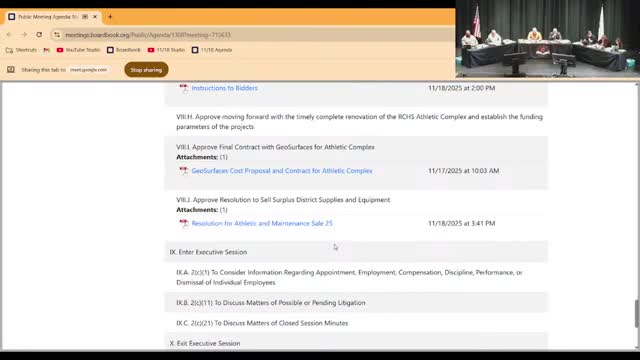Richland County CUSD 1 board approves $14.9 million athletic complex plan with all‑pivot turf
Get AI-powered insights, summaries, and transcripts
Subscribe
Summary
The Richland County Community School District 1 board voted to approve a $14,886,000 athletic-complex renovation featuring all-pivot synthetic surfaces, a structural concrete base and expanded bleacher depth. The motion passed after hours of technical, budget and maintenance discussion.
The Richland County Community School District 1 board voted to move forward with a $14,886,000 renovation of the district athletic complex that the board described as intended to provide multiuse, low‑maintenance playing surfaces and expanded spectator seating.
The approved package calls for pivot (non‑infill) synthetic turf on all fields, a structural concrete base for the playing surfaces, and an add‑on that increases bleacher row depth for spectator comfort. The motion, made by board member Dennis Anderson and seconded by Missus Lockley, passed on a roll‑call vote; one member, Mr. Wilson, voted no.
Board members and the vendor, Geosurfaces, spent more than two hours on technical tradeoffs in the weeks leading up to the vote. Geosurfaces representatives described three options for the district — an all‑pivot solution, a hybrid with iron‑turf on the football field and pivot on baseball/softball, or natural‑grass outfields — and presented warranties, maintenance expectations and stormwater engineering for each. The vendor said the pivot product carries an industry‑leading 12‑year warranty and the iron‑turf option carries a 10‑year warranty; natural‑grass was described as lower capital cost but requiring ongoing maintenance estimated at $50,000–$60,000 annually.
District leaders framed the vote as a balance between long‑term usability and fiscal responsibility. Board member Dennis Anderson said the board had performed extensive due diligence and that “the time has come to move” because of documented deficiencies and safety risks at the current facilities. Other members pressed for guardrails on financing: the motion sets funding parameters that rely primarily on alternative‑revenue bonds (the district’s 1% sales tax) and cash from the capital projects fund and projected state aid, with an annual debt‑service cap for tax‑supported borrowing.
Geosurfaces provided construction details the board requested: a structural base requiring subsurface retention trenches to manage runoff, turf options tailored by sport, and long‑lead items such as bleachers and scoreboards. The vendor also presented an optional scoreboard and streaming package; the board deferred that purchase to a separate motion to allow further review of procurement routes.
Board members asked specifically about maintenance and equipment transfer between different turf types. The vendor advised that mixing infill systems with non‑infill pivot turf is not ideal, and that coordinating footwear/cleat guidance and maintenance protocols would be needed if the board selected mixed surfaces. Several members said they preferred a consistent surface across the complex to simplify maintenance and reduce confusion for teams that practice and play in different locations.
Next steps include final engineering, utility locating, and procuring long‑lead items; the vendor and district said they hope to finalize contracts and begin early site work as the bid documents and permitting are completed. The district also committed to holding a community open house once final designs are available.
The board approved the motion after the district narrowed the project parameters and confirmed funding limits.
